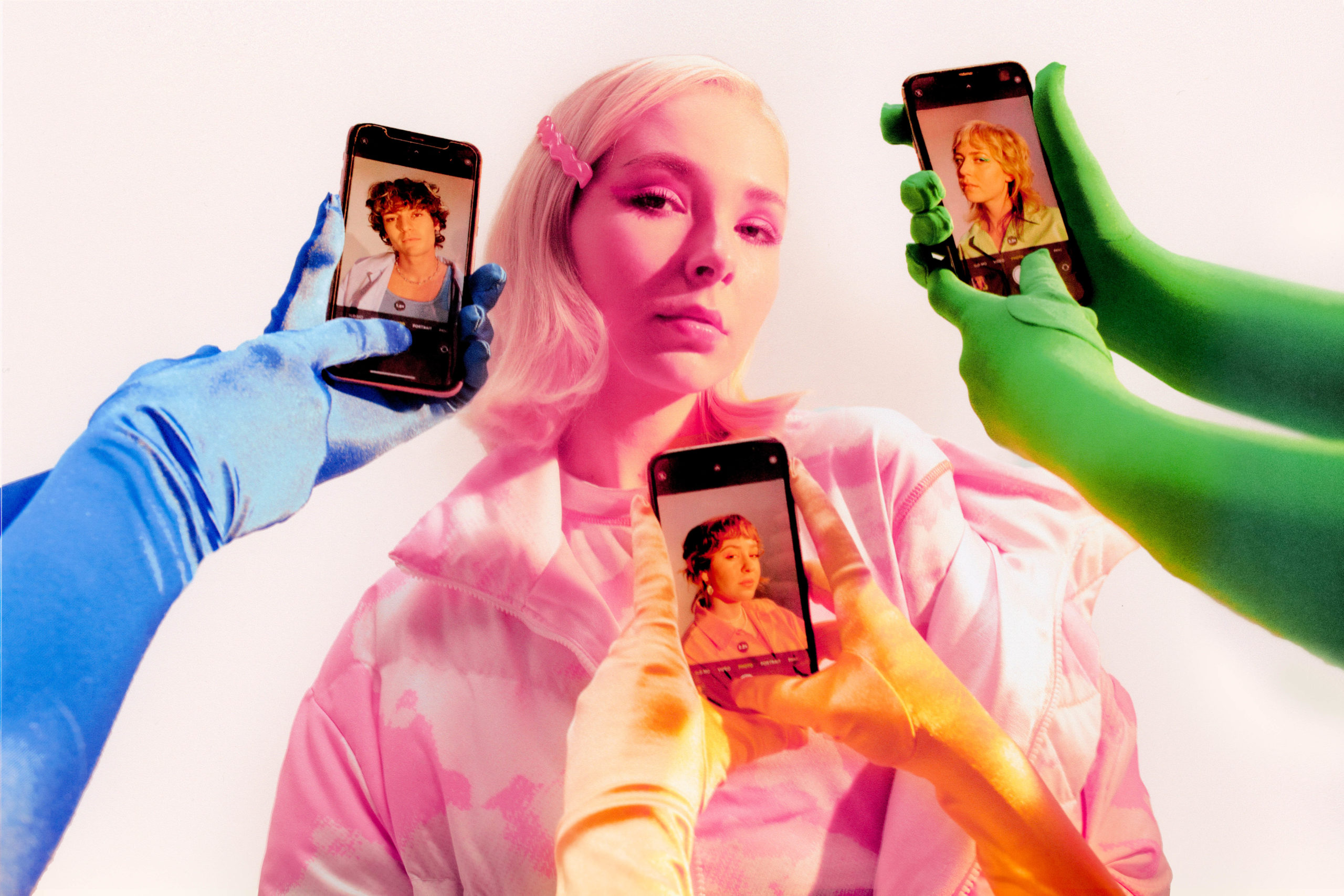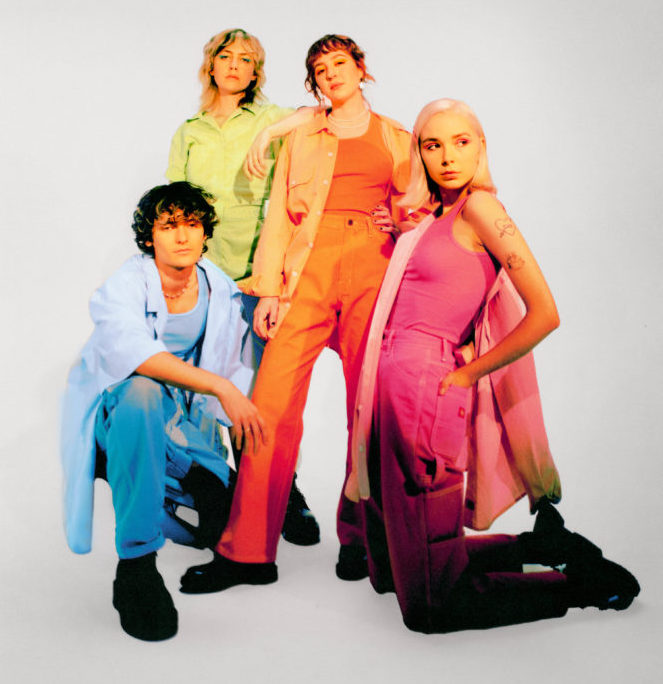Lydia Night is raging against the machine. And the machine drinks a warm cup of lemon water first thing in the morning.
“Seeing all these people that are doing so well, drinking lemon water, and going on a run at 5 am and they’re so happy because of that,” said Night. The 21-year-old singer and rhythm guitarist of L.A. pop-rock upstarts, The Regrettes, is talking of the kind of people who inspired the songs on their energetic third album, Further Joy. The rest of the band chuckles.
Guitarist Genessa Gariano says Night was always someone she could turn to when it came to mental health. When they formed their band, normalizing those teen insecurities — exploited by a multi-billion-dollar wellness industry — became a central focus of the music on their debut, Feel Your Feelings Fool!
[embedded content][embedded content]
The Regrettes doubled down on that angst on their third record, which is awash in punk guitars and biting lines, such as on the excellent rocker “Nowhere” when Night goes, “Used to want the body that I got right now/ So, why the hell I gotta lose a couple more pounds?”
The music has clearly struck a nerve for their teenage fans. At the end of April when the Regrettes played both weekends at Coachella, Night said she was shocked that fans were already screaming back the lyrics to her songs, which had barely been out for a week.
The Regrettes recorded Further Joy in January 2021 in Joshua Tree, California. Right now, they should be on the road rocking it throughout North America and Europe. But on May 10 after their Toronto show, Night was feeling intense stomach pain. She had her appendix removed two days later, and the band rescheduled their tour dates for July and August.

SPIN: I hear an immense growth throughout Further Joy. Not only emotional growth but musical growth. Can you talk a bit about that?
Lydia Night: The first record was mostly written before we even were in a band together. … And the second album was more collaborative but still like very much trying to stick to what we had built with that first record. Then this third album was just kind of us all saying “fuck it” and making the album that we wanted to make as the adults that we are now.
Genessa Gariano: Every album made so much sense for the time. Every album was 100% authentic and I think that’s why [Further Joy] makes so much sense for now. It’s a let-it-all-go album. Even when it is about not being able to let it all go, I think that helps let it all go.
Night: It just feels like freedom. It feels like secrets I didn’t even realize I had are being talked about on the album. It’s no one’s business, but it feels really good to make it people’s business because I feel like it’s therapeutic for me to know that talking about these things can help others.
Why is writing about mental health so important to you?
Gariano: It’s something, honestly, that I think Lyd taught me a lot about when we were younger, when I really was kind of closed off. Going forward, I feel like our relationship was founded in that. And Drew and Brooke I feel like have that in their core as well. I think it just makes sense that we’ve continued to do that outside of just conversations—I think it is a part of us.
Night: It’s so funny, I didn’t even realize until the album was done how it really felt like a modern, adult version of Feel Your Feelings Fool! That album was very surface-level drama and things, but also a lot of real subjects, like body image as a 15-year-old versus now.

Those themes around trauma and mental health are showing up in a lot of music these days. Why do you think that is?
Dickson: I think our generation has been experiencing a collective trauma over the last few years. Everyone’s depressed, everyone’s anxious, and everyone is feeling uncertain about the future. If I speak specifically to our generation, there’s uncertainty about jobs and financial security and just trying to make it in our capitalistic society. Our parents were having kids and buying their houses by the time they were our age, and the whole life trajectory of the nuclear family doesn’t exist anymore.
We’re still learning and growing and figuring out things and doing our best in a country and society that is kind of working against us and working against most people at this time, so I think it’s just harder to exist. Yet, we also have more awareness of each other and more empathy for each other because we have things like social media and we have the internet in our pockets where we can research or become aware of anything at any time.
Night: And that’s terrifying. Because of that awareness of what everyone else is doing, it makes it so easy to compare your life to other people right now and how happy other people seem. And that’s a lot of where Further Joy came from—seeing all these people that are doing so well and are drinking lemon water and going on a run at 5 am and they’re so happy because of that [the band chuckles]. Like those people are fucking not you know, but if they are that’s amazing, but it doesn’t make you happy.
What do you bond over besides music?
Thomsen: Food. [Rest of the band excitedly agrees.]
Gariano: Any diner setting. Also a good board game. That’s what kept us together during COVID.
Musically, your albums stretch across a few different genres, from guitar-driven garage to pop-punk to synth-pop. Is that something you plan out before recording?
Night: I think it really comes down to a feeling of what we’re inspired by. Like the first album, we never were like, “we’re a punk band, we’re making a punk album.” That was something that we got labeled with and that’s fine … but I think that [Further Joy] is our punkest album in terms of what we’re standing for and what we’re talking about and how much we rebelled against what we thought we had to be doing.
What musicians or bands inspired you while making Further Joy?
Night: The 1975, Charli XCX, Gorillaz, Robin, Taylor Swift, The Cure, The Clash … and also No Doubt and Gwen Stefani, obviously.
Gariano: Like early 2010s, maybe like Katy Perry. Little influences and music from then made us feel good.

Leave a comment